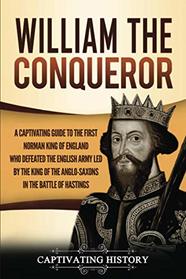This book makes the point that in medieval times, bastardy didn't necessarily preclude a person from the throne. Captivating History uses a lot of ink to explain that bastardy was so common amongst royals that the Church and other royals did not consider it to be a problem. William was the first son of Duke Robert and his concubine. Although the couple eventually married other people, William was well-loved by his parents. It wasn't until long after William's reign that 'the Bastard' was added by later chroniclers.
This book tells the Norman Conquest through the lens of William's life and leadership. Before reaching his majority, William showed that he was an accomplished leader by reining in his foes, making reasoned judgments, gifting to churches, forgiving his enemies, and appointing good officials. William was a descendant of Rollo and was Duke of Normandy from 1035.
There's a spot-on explanation regarding the Normans. They spoke and lived as French but were actually descendants of Germanic-Scandinavian warriors. "So technically, the Norman invasion of England wasn't done by the French but by French-speaking Germans who, in all likelihood share some common ancestry with the Anglo-Saxons who were inhabiting England at the time." (p. 32) I believe this is an important distinction that most don't understand. This is the best explanation I've read so far.
Before William's Norman Conquest, he was busy defending lands because there were many princes and nobles with dreams of ruling. However, William had a secure control of Normandy by 1060, following his long struggle to stabilize his leadership.
One factor that came into play during this time was the inbreeding of the royals in Europe. Royalty was a very small club and they were all interrelated in some way -- and in some cases, they were related in complicated family relationships. Thus, when the English throne came up, there were many men with just cause to think they were eligible to claim the crown.
Please note: This book explains William rather more than the Norman Conquest. Captivating History has another very fine publication explaining the Norman Conquest of England in great detail. Rather, this explains William's leadership style (it was particularly gory; let's just say he didn't believe in taking prisoners) and explains the outcome of the Norman invasion of England.
The book goes on to explain some of the most important ways William changed England. I was surprised to learn that William killed thousands of his English subjects. He treated rebellion with a scorched-earth policy, destroying everything in his path. However, with his strong leadership, he combined the Anglo-Saxons with the Normans, which created a new identity of English. William holds the record as the last foreign power to invade Great Britain and maintain control of the entire country.
This book tells the Norman Conquest through the lens of William's life and leadership. Before reaching his majority, William showed that he was an accomplished leader by reining in his foes, making reasoned judgments, gifting to churches, forgiving his enemies, and appointing good officials. William was a descendant of Rollo and was Duke of Normandy from 1035.
There's a spot-on explanation regarding the Normans. They spoke and lived as French but were actually descendants of Germanic-Scandinavian warriors. "So technically, the Norman invasion of England wasn't done by the French but by French-speaking Germans who, in all likelihood share some common ancestry with the Anglo-Saxons who were inhabiting England at the time." (p. 32) I believe this is an important distinction that most don't understand. This is the best explanation I've read so far.
Before William's Norman Conquest, he was busy defending lands because there were many princes and nobles with dreams of ruling. However, William had a secure control of Normandy by 1060, following his long struggle to stabilize his leadership.
One factor that came into play during this time was the inbreeding of the royals in Europe. Royalty was a very small club and they were all interrelated in some way -- and in some cases, they were related in complicated family relationships. Thus, when the English throne came up, there were many men with just cause to think they were eligible to claim the crown.
Please note: This book explains William rather more than the Norman Conquest. Captivating History has another very fine publication explaining the Norman Conquest of England in great detail. Rather, this explains William's leadership style (it was particularly gory; let's just say he didn't believe in taking prisoners) and explains the outcome of the Norman invasion of England.
The book goes on to explain some of the most important ways William changed England. I was surprised to learn that William killed thousands of his English subjects. He treated rebellion with a scorched-earth policy, destroying everything in his path. However, with his strong leadership, he combined the Anglo-Saxons with the Normans, which created a new identity of English. William holds the record as the last foreign power to invade Great Britain and maintain control of the entire country.




